African violets are small plants that promote abundant flowering throughout the year. If you want these beautiful violets to remain healthy and constantly bloom, you need to be particular about the correct use of fertilizers for these plants.
But what kind of fertilizer is good for African violets? Let’s find out.
Generally, African violets thrive when dosed with a well-balanced fertilizer with NPK of 20:20:20 throughout the year. However, during the blooming season, a fertilizer with an NPK ratio of 12:36:14 would help a lot. You can use any form of fertilizer, including liquid, spike, and compost.
Keep reading this article if you need to know what kind of fertilizer can help your African violets flourish the whole year along with beautiful blooms.
We will also cover all other information regarding fertilizing the plant to keep them thriving for a long time.
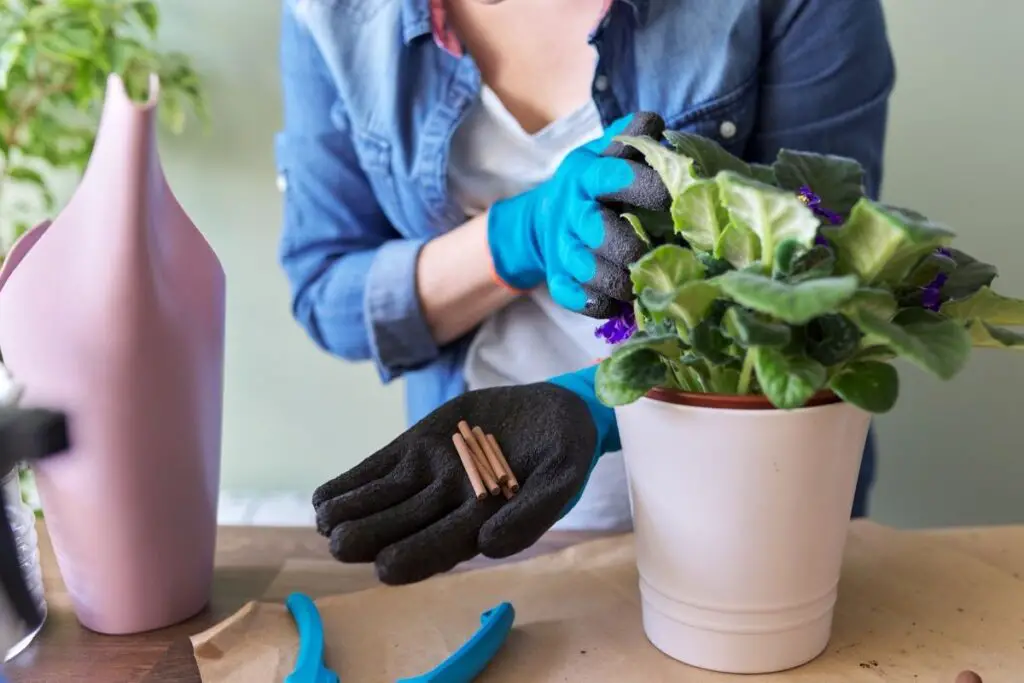
Why fertilizing the African violets is necessary?
The African violets can thrive all year if they get the proper nutrients, and it helps them remain strong and produce blooms.
While preparing the soil mix, you might add some components which can do the job of fertilizer, but still, the nutrients get washed away slowly with each watering.
So it is vital to feed your African violets with fertilizers to help them get all the essential nutrients to increase their metabolism and strength.
Your plants might survive without fertilizers, but they won’t look appealing. The leaves might grow smaller, or there might not be any blooms in the plants.
If you want your African violets to be beautiful and loaded with blooms, you need to give them sufficient nutrients and revitalize the soil to encourage healthy growth.
If your African violets are experiencing any nutrient deficiency, they will show you some signs, some of which are:
- Colour fades, starting from the tips and margins of the leaves, and slowly spreads to the entire leaf.
- Borders of lower leaves start curling.
- Stunted growth and loss of leaves.
- Yellowing of the leaves.
- Older leaves turn purple.
- Young leaves become lighter than usual.
You need to check how your plant is doing daily. Once you see such signs in your plant, you need to work on the problem as soon as possible.
What is the best fertilizer for your African violets?
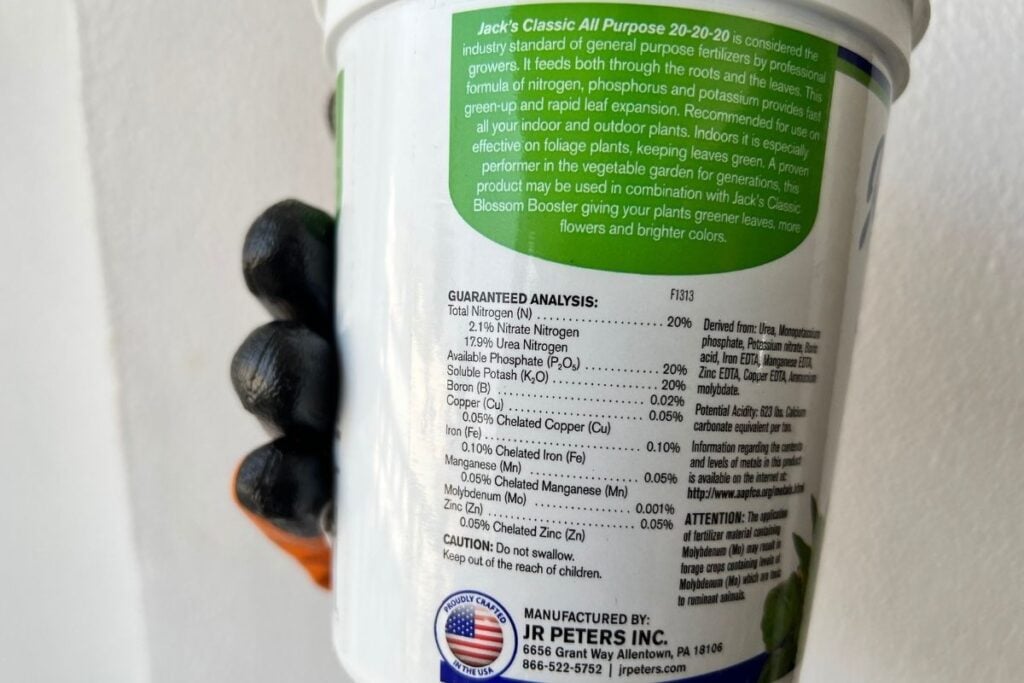
There are many fertilizers in the market, and it might be a tricky job to choose the right fertilizer for your African violets. You even might get confused while choosing the correct combination for your violets.
To help your plant grow well, you will need to use the right fertilizer containing the right combination of nutrients to encourage your plant’s growth.
The things you need to look for while choosing fertilizer are:
- African violet-specific fertilizers because fertilizers explicitly made for African violets possess the right combination of nutrients.
- Water-soluble to make sure that all-important nutrients get well dissolved and absorbed by the plant.
- It must be urea-free because urea can be harmful to your delicate flowers.
The fertilizer that works well for the African violets is a fertilizer containing an NPK ratio 12:36:14 and helps produce the best blooms.
It means that your fertilizer contains 12% of nitrogen (N), 36% of phosphorous (P), and 14% of potassium (K). The rest of the parts contain other essential nutrients in smaller amounts.
It is prevalent to use a balanced fertilizer, that is, an NPK ratio of 20:20:20 or 10:10:10, throughout the year to keep the plants alive.
At the time of blooming, your African violets will need the nutrients in different ratios.
So before their blooming time, you need to provide them the fertilizer with the ratio of 15:30:15. The African violets will need more amount of phosphorous to give the best results in blooming.
Now that you are aware of the best-suited fertilizer for your African violets, you need to know the role of these combinations in your plant growth.
The three most essential nutrients the plant needs for healthy growth are:
Nitrogen (N)
- It promotes leaf and stems growth.
- It gives your plant a green color.
- It helps your plants fight pests.
Phosphorous (P)
- It helps to store energy.
- It encourages photosynthesis.
- It helps in the ripening of seeds.
- Develops root system.
- It encourages beautiful fluffy blooms.
Potassium (K)
- It makes the plants strong.
- It makes the seeds, flowers, and leaves large.
- Resists diseases.
- It prevents yellowing or browning of leaves.
- It helps to circulate other nutrients around the plant.
Looking for gardening supplies? We have tested 100's of products before recommending them to you guys. Check out our best pick below:
| Image | Gardening Supplies | Best Price? |
|---|---|---|
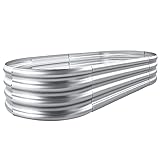 Top
Top Top
Top | Raised Garden Bed Kit | Check On Amazon |
 | XLUX Soil Moisture Meter, Plant Water Monitor, Soil Hygrometer Sensor for Gardening, Farming, Indoor and Outdoor Plants, No Batteries Required | No Results |
 Top
Top Top
Top | 82 Pcs Garden Tools Set and Extra Succulent Tools Set | Check On Amazon |
 | Joeys Garden Expandable Garden Hose with 8 Function Hose Nozzle, Lightweight Anti-Kink Flexible Garden Hoses, Extra Strength Fabric with Double Latex Core, (50 FT, Black) | No Results |
 Top
Top Top
Top | Dual Chamber Compost Tumbler | Check On Amazon |
 Top
Top Top
Top | Sunnyglade Plant Stakes | Check On Amazon |
 Top
Top Top
Top | Organic Cold Pressed Neem Seed Oil | Check On Amazon |
 Top
Top Top
Top | Mighty Mint Gallon :-Insect and Pest Control Peppermint Oil | Check On Amazon |
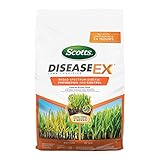 Top
Top Top
Top | Scotts DiseaseEx Lawn Fungicide | Check On Amazon |
 Top
Top Top
Top | Jacks Classic 20-20-20 All Purpose Fertilizer | Check On Amazon |
 Top
Top Top
Top | 30,000 Seeds Pollinator Attracting Wildflower Mixture | Check On Amazon |
 Top
Top Top
Top | Survival Vegetable Seeds Garden Kit-Over 16,000 Seeds | Check On Amazon |
Other nutrients
African violets also need other nutrients, like sulfur, calcium, iron, boron, magnesium, copper, and many more, in small quantities for the all-round development of the plant.
Types of fertilizers
The types of fertilizers available in the market can be categorized into three types. These are:
- Liquid fertilizer
- Granular fertilizer
- Spikes and capsules
Now let’s understand these in detail.
Liquid fertilizer
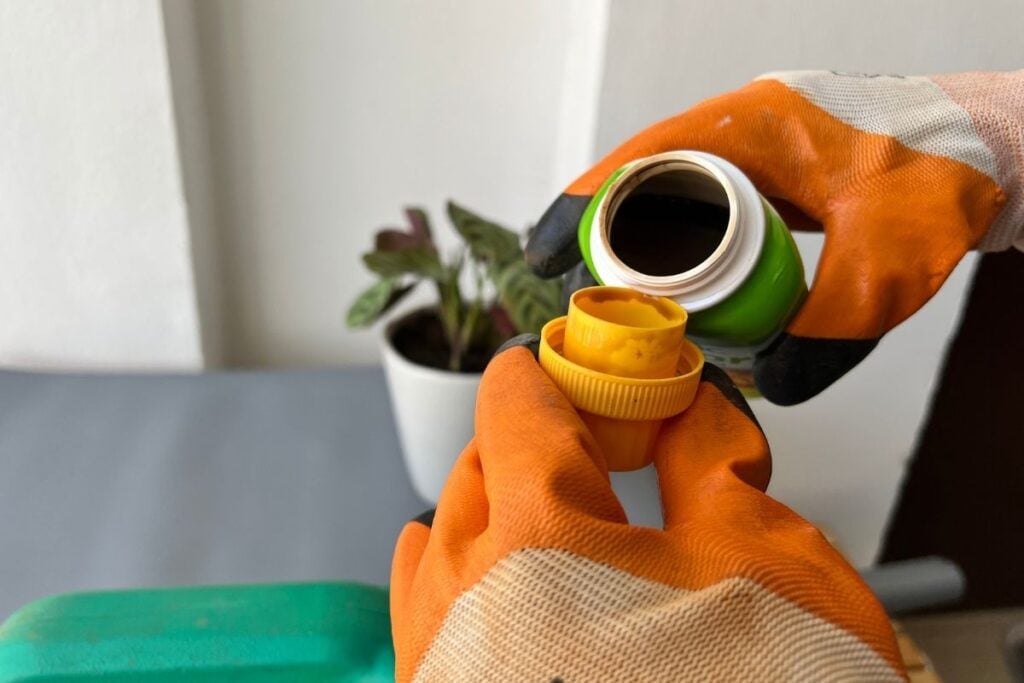
Primarily, liquid or water-soluble fertilizers are recommended for African violets for good growth. One of the main advantages of using this fertilizer is that it can reach the plant’s root system faster.
If you have time to fertilize your plant regularly, then you can use liquid fertilizers. This fertilizer also helps in the easy absorption of nutrients.
You need to be careful with liquid fertilizers as you don’t want to damage your plants by over-fertilizing them.
Granular fertilizer
These are the slow-release fertilizers. This type of fertilizer helps in the flexible feeding process. If you do not have much time to fertilize your plants daily, you can use granular fertilizers.
Even though it might slow the absorption rate, it will give the plant all its nutrients slowly as per need. You can apply less than the recommended dosage to avoid over-fertilization.
Some granular fertilizers can even be used by mixing them with water, and you can use this method if you think that your plant is in desperate need of an instant boost of nutrients.
Spikes and capsules
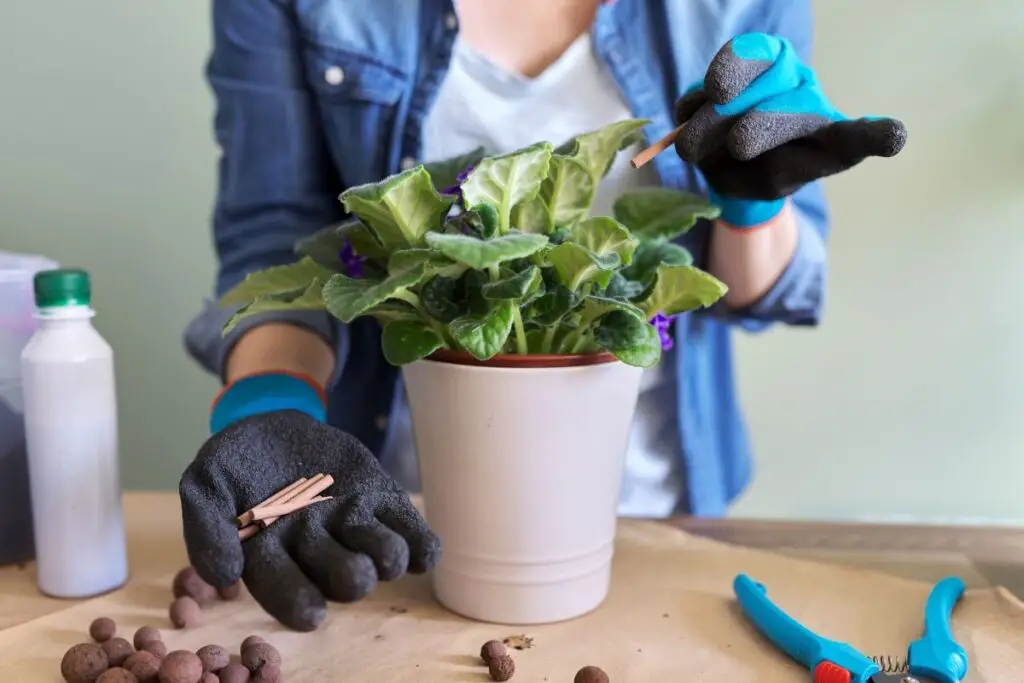
The slow-release fertilizers are less messy than any other type and are easy to store. They are used to revitalize the microbiome activity in the soil, which will help the plant resist pests and diseases.
Another benefit of slow-release fertilizer is they do not leach the soil with regular watering.
Using slow-release fertilizers has less risk of burns in the leaves or flowers, and you do not have to worry about over-fertilizing your plant.
Homemade fertilizers
If you are more into homemade or organic fertilizers than commercial ones, there are few options.
Compost
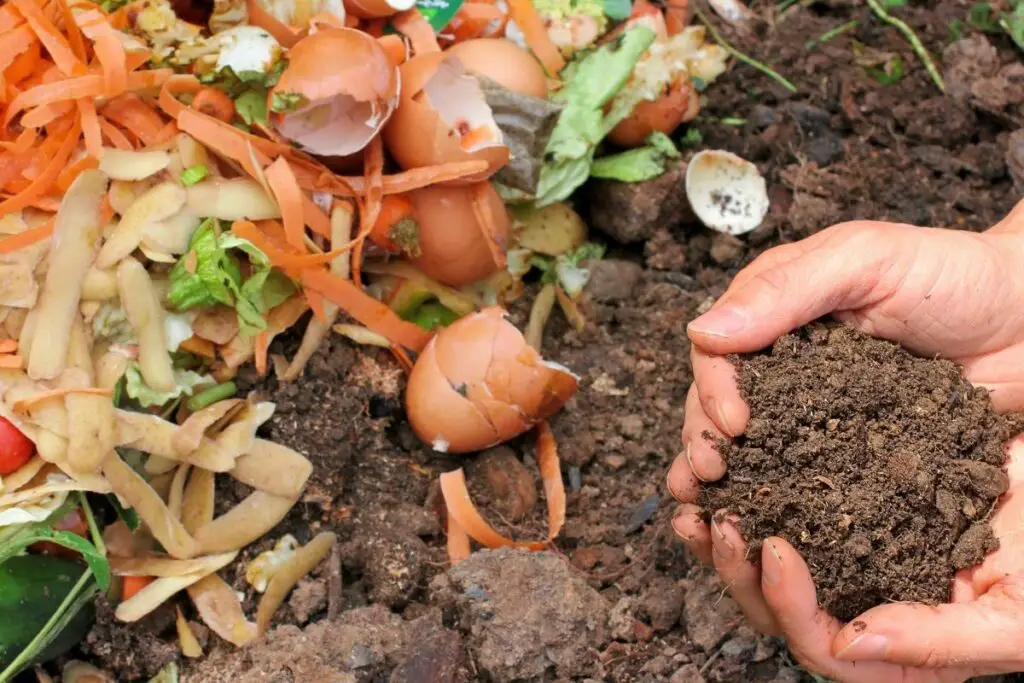
Compost is a vital fertilizer needed for African violets. They help recycle the organic waste from the kitchen, like the leftover fruits, vegetable peels, eggshells, etc. They are rich in nutrients and will allow the plant to remain healthy.
Let us see the benefits of compost:
- It helps in giving the plant all the crucial nutrients for its healthy growth.
- It helps in retaining moisture needed for the plant.
- Improves soil aeration.
Compost tea
Sometimes, instead of using compost directly, you can make a compost tea, giving better results for your plants.
Soak all the compost in a bag filled with water and after 20 days, when the water turns yellow, use that water for fertilizing. If the water is too dark, dilute it with water before applying it.
Some drawbacks of using compost tea are:
- The nutrients might not be in the right combination.
- Releases a foul smell.
- Nutrients can leak from the soil.
Coffee grounds
Coffee grounds are a good choice for African violets. They not only fertilize the plant but also help in managing the acidity of the soil. African violets enjoy slightly acidic to neutral soil.
Coffee grounds will also help in keeping slugs and snails away from your plant. Coffee grounds are used because:
- They are high in nitrogen, contains other nutrients too.
- Water retention.
- Benefits the plant if used as a slow-release.
Best fertilizer for african violets
I have used a variety of fertilizers for all my African violets and what worked best for me are as follows:
- J R Peters Jacks Classic 12-36-14 Special Fertilizer
- Jacks Classic 20-20-20 All Purpose Fertilizer
- Worm Castings Organic Fertilizer
- Miracle-Gro Indoor Plant Food Spikes
You can pick any one of these for your African violets. Just make sure you use half of the recommended dosage to begin with.
How much fertilizer do African violets need?

After you have finished planting the African violets in your garden, you need to provide them a fertilizer containing an NPK ratio of 12:36:14, as described in the instruction label.
For prolific blooms, you should start fertilizing your plants with a high-phosphorous fertilizer. The NPK ratio should be 15:30:15. Use this fertilizer during the spring when the plant is actively growing. You can even use a balanced fertilizer (e.g., 20:20:20 or 10:10:10) throughout the year.
For regular fertilizing, you need to dilute fertilizer with water in a mixture of ¼.
If you are using compost as fertilizer, apply them to the top layer of the soil. Water the plant and the soil very well so that then nutrients can reach the roots.
You can also use compost while making the soil mix for the plant to let them do some fertilizer work.
How often should I fertilize the African violets?
There are two ways regarding how often you can fertilize your African violets and one is fertilizing with each watering, and the other is fertilizing with long intervals.
If you are fertilizing with each watering, dilute ¼ teaspoon of fertilizer with one gallon of water and apply it to the plant.
If you want to fertilize with long intervals, you need to maintain a gap of four to six weeks between fertilization. You can follow the instructions given on the bottle’s label.
You should reduce or stop fertilizing when winter arrives because the plants need less fertilizer during the cold months. Reduce it to 50% to the spring dose or the regular dose.
One more thing you need to keep in mind while fertilizing is never to apply fertilizers when your soil is dry. Applying fertilizer and not watering the plant and the soil well will result in a burnt root system due to excess nutrients.
How to fertilize African violets?
Let’s see how you can fertilize your African violets.
- While using a granular or slow-release fertilizer, sprinkle them on the ground and water them generously. Avoid the leaves and flowers to prevent burns.
- While using liquid fertilizer, apply the fertilizer using a spray bottle or a watering can.
- While applying compost, apply one layer on the soil and water well. You can mix compost with the soil while preparing the soil mix for the plants.
- You can either use coffee grounds as slow-release fertilizer or mix it with water and apply it by using a spray bottle to the plants.
While foliar feeding, spray the leaves gently with diluted fertilizer.
What happens if you over-fertilize your African violets?
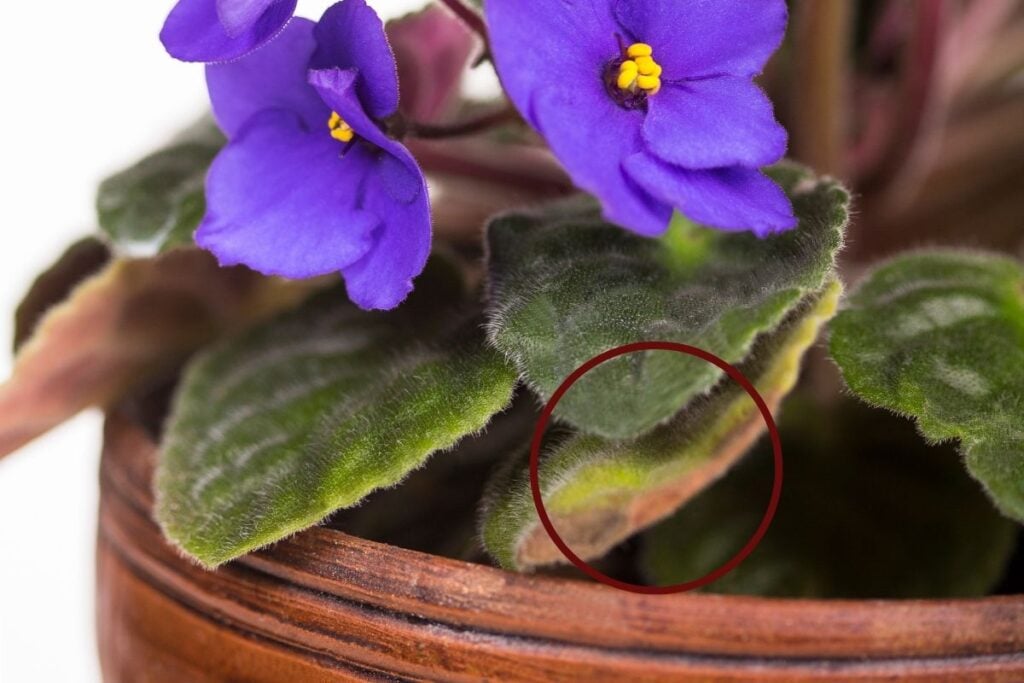
Sometimes, while fertilizing the plant, we over-fertilize them because we think more fertilizer will help them grow stronger. However, that is not the case.
Although less fertilizer doesn’t harm the plant, more fertilizer can cause severe damage. Some of the problems include:
- Accumulation of white salt-like texture in the rim of the soil bed.
- Dark brown spots on the center or tips of the leaves.
- Development of orange-colored crystallization clinging to the leaf hairs, mainly in the crown area.
- Wilted and brittle leaves, creates crack and lesions, slowly turning brown.
How to fix over-fertilized African violet?
You can fix your overfertilized African violets with the following steps.
- Remove the damaged leaves.
- Add lukewarm water to the soil to leach out any extra fertilizer salts.
- Remove the crystallization from the leaves and crown area.
- Continue watering with lukewarm water for the next few weeks until the problem is resolved.
- Avoid using fertilizing until the problem is fixed.
Final words
African violets are the plants that will grow and bloom the whole year if you provide them with all the nutrients through fertilization.
Remember that there is no harm if you apply less fertilizer, but always avoid over-fertilizing.
Less fertilization will not cause any harm, which more fertilization can do. But do not deprive the plants of fertilizers, and they need fertilizers to receive nutrients and better growth.
Water your plants well after applying fertilizers to help them reach the roots so that the plant can receive all the necessary nutrients.
Avoid fertilizing the dry soil to prevent root burns. Avoid sprinkling fertilizers on the leaves and flowers to keep them from burning.
Source: Wikipedia, African violet: Classical breeding, African Violet Society of America, In vitro propagation of African violet, University of Florida, North Dakota State University, The University of Georgia.
